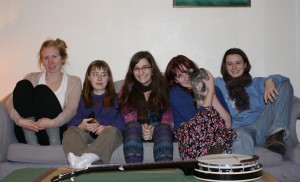By Meredith Carroll
carrollm@grinnell.edu
The smell of freshly made falafel wafts in from the kitchen. Bookshelves line one wall, including one built inside what was once the fireplace. Two couches and a rocking chair cluster around a table littered with newspapers. A guitar and a banjo complete the scene. Most Grinnellians know the house at 1130 East Street as Eco House. But the first word to get tossed around by its residents is “community.”
“I think it’s really important to know the people you’re going to be sharing spaces with,” said Adriana Walsh ’15.
From their chore chart (duties range from picking up the paper to carrying out a random act of kindness) to their shared love of music—three of the ten are banjo players—the residents of Eco House certainly put their words into practice.
The residents of Eco House are Walsh, Kaelin Swift ’15, Eleanor Stevens ’14, Elena Lynch ’13, Amy Linder ’15, Savannah Duby ’13, David Brown ’14, Clare Boerigter ’14, Kane Balser ’13 and Cailey Arensman ’15. Doors are often open, and members congregate in the living room to work on homework and socialize.

Between the “spontaneous breaking into three-part bluegrass harmony [and the] kitten who runs around and attacks Styrofoam peanuts, [Eco House is] a really comfortable place to live,” Arensman said.
A favorite gadget of the residents is their electricity use monitor. While making scones last weekend, Arensman realized that the electric oven used far more energy than she had ever stopped to consider.
“I think everybody has small ways that they can change [in] their life and try to conserve a little more,” Arensman said.
In many ways, these small changes define life in the environmentally conscious house.
“[This is] a place where people actually put their ideals into practice,” Stevens said.
They do so not in leaps and bounds, but in actions as simple as turning off a light switch. Above all, they do so by holding each other accountable: taking shorter showers, turning off unnecessary lights, choosing foods with smaller carbon footprints.
The members of Eco House have larger-scale projects as well. They compost, maintain a prairie garden and work with interested community members to implement similar strategies throughout Grinnell. Stevens hopes to collaborate with Food House on a solar oven. Duby, House Coordinator, is planning a rain garden, which would collect runoff water from the roof that would otherwise be wasted.
Part laboratory and part living space, Eco House grounds its genuine commitment to the environment in a supportive community. In many ways, the sense of community that defines the house also underpins its commitment to the environment.
“[Eco House is] half about living the sustainable lifestyle and learning new techniques to do that,” Walsh said. “[It is] about providing a space for people to be excited about implementing those things.”

































































